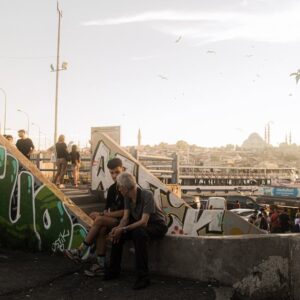
Imagine risking your life to deliver food and medicine to a war-torn region—only to find yourself stranded in open water, fearing an unseen enemy. This isn’t a dystopian novel plot. It’s the reality for activists aboard the Gaza Freedom Flotilla, who recently reported an alleged drone attack near Malta. Their distress call highlights a chilling trend: humanitarian efforts are increasingly caught in the crossfire of geopolitical conflicts. If you’ve ever wondered how to separate fact from propaganda in crisis zones or how to support aid workers facing invisible threats, this story matters—and so does understanding what comes next.
The Incident: What We Know (And What We Don’t)
On a tense morning in the Mediterranean, the Gaza Freedom Flotilla—a coalition of ships aiming to break Israel’s blockade of Gaza—issued an urgent SOS. Crew members claimed their vessel was targeted by a drone off Malta’s coast, leaving them adrift with damaged communications. Details remain murky: No group has claimed responsibility, and Maltese authorities have yet to confirm the attack. What’s clear is that this incident revives painful memories of the 2010 Mavi Marmara raid, where Israeli forces killed nine activists aboard a similar flotilla.
Why Malta? The island nation’s strategic location makes it a common transit point for vessels heading toward Gaza. But its limited naval resources also raise questions: Could this area become a new hotspot for covert maritime strikes? With conflicting reports swirling, one thing is undeniable—humanitarian missions are navigating increasingly dangerous waters, both literally and politically.
A Shadow War at Sea?
Drone attacks on civilian ships aren’t science fiction anymore. From the Red Sea to the Black Sea, unmanned aircraft are reshaping conflict dynamics. If confirmed, this would mark the first known drone strike targeting a Gaza aid ship—a troubling escalation. But who benefits from such an attack? Critics point to Israel’s longstanding blockade of Gaza, while others speculate about rogue actors seeking to inflame tensions. The lack of transparency fuels conspiracy theories and erodes trust in international bodies meant to protect civilian lives.
Here’s what gets overlooked: Modern drones can be launched from anywhere—even commercial vessels. This creates a ‘plausible deniability’ loophole that bad actors exploit. Without clear evidence, accountability becomes nearly impossible. For activists, this uncertainty is as dangerous as the attack itself. How do you prepare for threats you can’t see or trace?
Malta’s Dilemma: Neutral Ground or Complicit Bystander?
Malta’s response—or lack thereof—speaks volumes. As a EU member with close ties to both Arab states and Israel, Malta walks a diplomatic tightrope. Its coast guard reportedly located the damaged ship but didn’t corroborate the attack claims. This hesitancy isn’t new: Small nations often avoid antagonizing powerful allies. But when human lives are at stake, does neutrality become complicity?
Legal experts argue that under maritime law, Malta has a duty to investigate incidents in its waters. Yet geopolitics muddy the waters. If Malta downplays the event to avoid blowback, it sets a dangerous precedent: Humanitarian ships could be labeled ‘fair game’ in disputed zones. This isn’t just about one ship—it’s about whether international law can survive in an era of remote-controlled warfare.
Media Wars: Why Your News Feed Is Part of the Battlefield
Within hours of the SOS, social media erupted. Pro-Palestine accounts shared grainy footage of smoke near the ship, while Israeli media dismissed it as a ‘stunt.’ This split isn’t accidental—it’s a feature of modern information warfare. Humanitarian crises now play out in real-time across TikTok and X (formerly Twitter), where narratives are weaponized to sway public opinion.
So how do you stay informed without getting played? First, question the source: Does the outlet have a history of bias? Second, look for corroboration: Are multiple credible agencies reporting similar facts? Finally, watch the language: Phrases like ‘alleged’ or ‘reportedly’ signal uncertainty. In fog-of-war situations, patience isn’t just virtuous—it’s essential.
What Comes Next for Gaza Aid Efforts?
Blockade-running flotillas have operated since 2008, but tactics are evolving. Post-attack, organizers might adopt anti-drone tech or reroute through safer corridors. But tech fixes can’t address the root issue: Gaza’s humanitarian crisis requires political solutions, not just bandaids. With over 2 million Palestinians facing food insecurity, the world’s reliance on grassroots aid groups is a damning indictment of failed diplomacy.
Here’s the hard truth: Until governments pressure Israel to ease its blockade, civilians will keep dying—both from bombs and preventable shortages. Supporting NGOs is crucial, but real change demands voter pressure on lawmakers to prioritize human rights over geopolitical games.
Resources: Your Questions Answered
1. Why does Israel block aid to Gaza?
Israel claims it prevents weapons smuggling, but critics call it collective punishment. The blockade, ongoing since 2007, restricts most goods except limited humanitarian supplies.
2. How can I verify reports from conflict zones?
Use tools like Bellingcat’s open-source guides or cross-check claims with trusted NGOs like Amnesty International and UN agencies.
3. Are flotillas effective?
They raise awareness but rarely deliver large-scale aid. Political advocacy and funding UNRWA (UN’s Gaza agency) often have more direct impact.
4. What’s Malta’s role in Mediterranean security?
Malta participates in EU naval missions but lacks major defense capabilities, relying on Italy and others for regional security.
Conclusion: A Wake-Up Call We Can’t Ignore
The Gaza Freedom Flotilla incident isn’t just a dramatic headline—it’s a snapshot of our fractured world. As warfare goes high-tech and information gets weaponized, ordinary people pay the price. But there’s hope: Every time we demand accountability, share verified facts, or support humanitarian groups, we chip away at the culture of impunity. The next time you see a crisis unfold, remember: Staying engaged isn’t optional. It’s how we prevent the Mediterranean—and our conscience—from becoming a no-man’s land.






